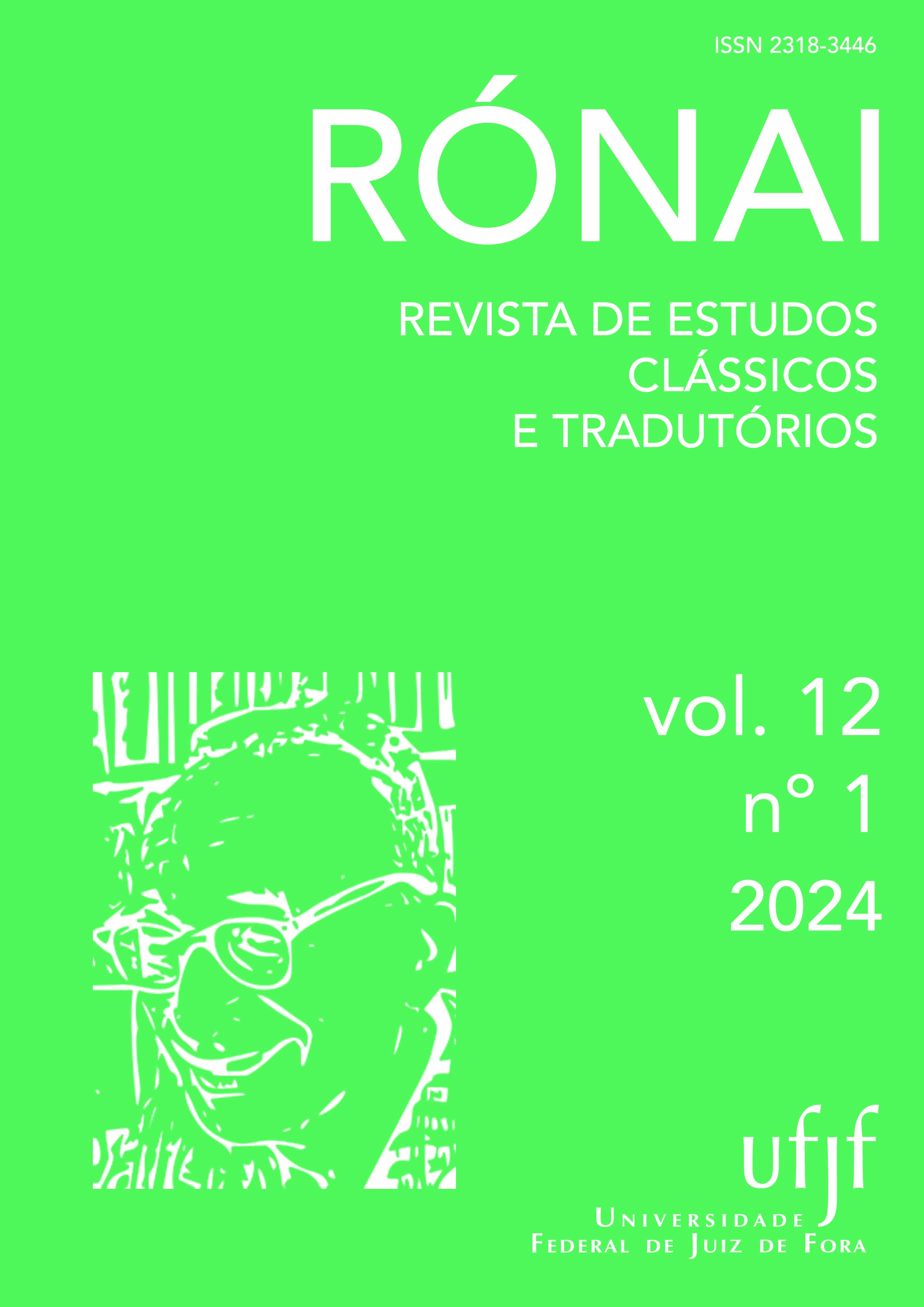Tradução de Cícero, De natura deorum I, 6-12
DOI:
https://doi.org/10.34019/2318-3446.2024.v12.44477Palavras-chave:
Cícero; filosofia helenística; literatura latina; língua latinaResumo
Obra de 45 a. C., o De natura deorum de Cícero é um tratado que lida com a questão da natureza dos deuses e de sua atuação no mundo. Nele, o autor representa um diálogo em que se confrontam representantes romanos das três correntes filosóficas do período helenístico mais influentes no ambiente romano: o epicurismo, o estoicismo e o ceticismo acadêmico. Cícero convida seu destinatário, Bruto, a examinar os argumentos a favor e contra cada uma das teorias apresentadas, para chegar à concepção mais provável a respeito dos deuses. No trecho que traduzimos, tomado do proêmio da obra, o autor, antecipando possíveis críticas ao trabalho que vem realizando, que consiste em confiar às letras latinas a filosofia grega, defende não apenas sua atividade de escrever filosofia, mas também o pensamento da escola acadêmica, à qual se associa.
Downloads
Referências
Referências
AUVRAY-ASSAYAS, C. Cicéron. Paris: Belles Lettres, 2006.
AUVRAY-ASSAYAS, C. Réécrire Platon? Les enjeux du dialogue chez Cicéron. In: COSSUTTA, F & NARCY, M. La forme dialogue chez Platon. Grenoble: Jérôme Millon, 2001, p. 237-255.
BOYANCÉ, P. Études sur l’humanisme cicéronien. A collection of 18 articles previously published in periodicals. Brussels: Universa, 1970.
CÍCERO. Academica. Text revised and explained by J. S. Reid. Hildesheim: Georg Olms, 1984.
CÍCERO. De diuinatione. With an English translation by W. A. Falconer. London: Harvard University Press, 1992.
CÍCERO. De finibus bonorum et malorum libri I, II. Edited by J.S. Reid. Cambridge: University Press, 1925.
CÍCERO. De finibus bonorum et malorum. Recognouit breuique adnotatione critica instruxit L. D. Reynolds. Oxford: University Press, 1998.
CÍCERO. De natura deorum / Academica. With an English translation by H. Rackham. London: Harvard University Press, 1979.
CÍCERO. De natura deorum. Liber primus. Edited by A. S. Pease. Cambridge: Harvard University Press, 1955.
CÍCERO. De natura deorum. Libri tres. With introduction and commentary. Edited by J. B. Mayor and J. H. Swainson. Cambridge: University Press, 2009.
CÍCERO. De natura deorum. Recognouit O. Plasberg. Leipzig: Teubner, 1933.
CÍCERO. Epistulae ad Atticum. Edited by D. R. Shackleton Bailey. Stuttgart: Teubner, 1987.
CÍCERO. Opere politiche e fiolosofiche di M. Tullio Cicerone (I termini estremi del bene e del male, Discussioni tusculane, Le stato, Le leggi, I doveri). A cura di Nino Marinone. Turim: Unione Tipografico-Editrice Torinese, 1980.
LUCRÉCIO. De rerum natura. John Martin (editor). Leipzig: Teubner, 1953.
MICHEL, A. Rhétorique et philosophie chez Cicéron. Paris: PUF, 1960.
POWELL, J. G. (ed.) Cicero the philosopher / Twelve papers. Edited and introduced by J. G. Powell. New York: Clarendon, 1995.
RUCH, M. Le préambule dans les oeuvres philosophiques de Cicéron. Paris: Belles Lettres, 1958.
TAYLOR, B. Lucretius and the language of nature. Oxford: University Press, 2020.
Downloads
Publicado
Como Citar
Edição
Seção
Licença
Copyright (c) 2025 Sidney Calheiros de Lima

Este trabalho está licenciado sob uma licença Creative Commons Attribution 4.0 International License.
Direitos Autorais
Autores que publicam nesta revista concordam com os seguintes termos:
1. Autores e autoras mantém os direitos autorais e concedem à revista o direito de primeira publicação, sendo a publicação licenciada sob a Creative Commons Attribution License 4.0 Internacional.
2. Os autores e autoras têm permissão e são estimulados(as) a publicar e compartilhar o trabalho com reconhecimento da publicação inicial nesta revista.
3. Os autores e autoras dos trabalhos aprovados autorizam a revista a ceder o conteúdo de seus trabalhos, após sua publicação, para reprodução em indexadores de conteúdo, bibliotecas virtuais e similares.
Para mais informações sobre a Creative Commons Attribution 4.0 International License, acessar: https://creativecommons.org/licenses/by/4.0/
Isenção editorial
O conteúdo dos artigos publicados é de inteira e exclusiva responsabilidade de seus autores, não representando a posição oficial da Rónai - Revista de Estudos Clássicos e Literários ou do Faculdade de Letras da Universidade Federal de Juiz de Fora ou das instituições parceiras.



